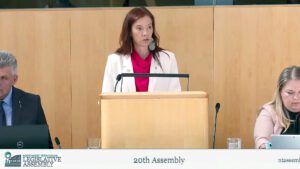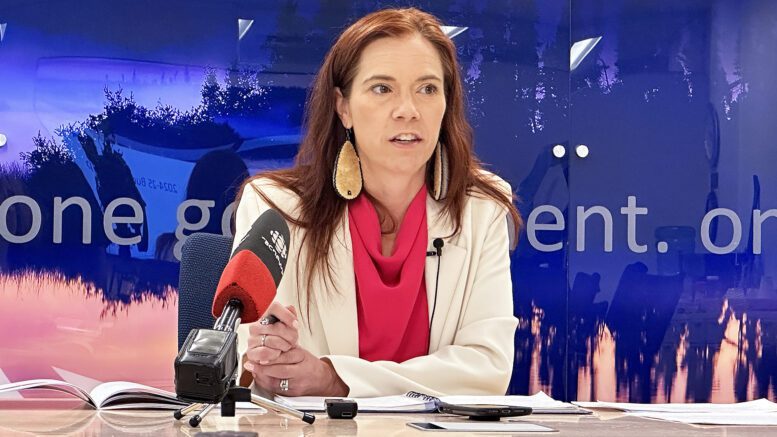Part of a jail will close, some leased offices will be emptied and the is a possibility of a few dozen cuts to GNWT positions, but there are no major new taxes in the first proposed operating budget of the 20th Legislative Assembly.
The financial blueprint for the 2024-25 fiscal year released today projects an operating surplus of $294 million with $2.6 billion in revenue and $2.2 billion in spending.
Combined, the proposed operating budget and the upcoming capital budget, will see spending of almost $2.6 billion.

NWT Finance Minister Caroline Wawzonek meets with the media in an embargoed conference prior to her budget address on Friday morning. (James O’Connor/CKLB.)
Caroline Wawzonek is the NWT’s Finance Minister.
As per tradition with many finance ministers, was wearing a new pair of white runners, which she said were “very practical and responsible shoes.”
She said: “This is a practical and realistic budget aimed at reducing our overall expenditures in 2024-25 … to both restore fiscal balance and increase our capacity to deal with unexpected events. As such, this is not a ribbon-cutting budget.”
In fact, it will be exactly the opposite for the medium security Fort Smith Correctional Complex.
In recent times, the jail’s men’s unit has been running half-empty, stated budget documents.
The $23.6-million medium-security facility at the jail for women opened in the fall of 2019, is not thought to be part of the closure, several media reports have indicated.
CKLB asked if ‘wellness centre’ could eventually mean ‘residential treatment centre’ the minister deflected, stating that no details have been worked out.
MLAs from across the NWT, including the former Thebacha riding representative, the one-time Salt River First Nation chief Frieda Martsellos, have repeatedly been calling for a drug treatment centre to be tried again in the NWT, so as not to be sending all addicts seeking recovery to facilities in the south.
When media pushed the minister for details, Wawzonek stated:
“Sometimes, I think this is why government doesn’t like to try and do new things without having it all tied up with a nice, nice tidy, little bow. I don’t have a nice little bow on top of this one.

NWT Finance Minister Caroline Wawzonek meets with the media in an embargoed conference prior to her budget address on Friday morning. (James O’Connor/CKLB.)
“What I can tell you is that I know Minister (Jay) MacDonald (Thebacha riding), obviously, he’s from Fort Smith, he’s already spoken to indigenous leadership there. So, they know this was coming, they knew that our desire to see a change is coming.
“And I want to not go too far in putting a box around what it might look like … what can we do to better utilize this facility and the staff that are there to do something that actually aligns with the priorities of the government, which includes trauma and healing?
So, will it include you know, formalized addictions treatment? Again, that’s probably a question for tomorrow. But we want to make sure that we’re providing something that better uses government dollars to fix problems that we are all seeing, including addictions, treatment, aftercare. But wanting to do it also hand in hand with the indigenous governments of the region. Because the other thing we hear is let’s not try to always have the government dictate what the solutions are to the people in regions.”
As for taxation, people avoiding cigarettes by vaping will be paying a couple of dollars more per cartridge, depending on its size. That vape tax hopes to bring in $252,000.
CKLB also asked the minister to speak to what impact this budget – which still has to be debated and approved by the Assembly – will have on Indigenous residents.
“The entire first section of all of our mandates speak to how we’re going to be collaborating and working with Indigenous governments. Housing is probably the first one I would go to … housing is a big one,” she said during a meeting with media Friday morning.
“We mentioned earlier about funding for the RCMP, but a lot of that’s coming in through the First Nations Policing Agreement … to ensure that there’s policing in small indigenous communities. So that’s another significant area where we want it to add.

NWT Finance Minister Caroline Wawzonek meets with the media in an embargoed conference prior to her budget address on Friday morning. (James O’Connor/CKLB.)
“But this actually continues across different departments. I’m just trying to ensure that again, if we are, where are we going to spend money? And how are we going to spend money. But before you do that, even again, back to Fort Smith, that you call and talk to the indigenous leadership in the region and see where we can work together to actually achieve mutual goals.”
Here are a few other highlights from the “realistic and responsible” fiscal plan presented to the Assembly by the minister:
- The Northwest Territories economy is stable and economic output, investment, imports, and earnings all expanded in 2023, and household spending, public expenditure, and resident employment expanded to surpass pre-pandemic highs.
- Property mill rates and some fees will be indexed to inflation and the carbon tax rate increased to $80 a carbon-equivalent tonne of greenhouse gas emissions on April 1.
- Effective April 1, 2024 to March 31, 2027, the carbon tax on diesel heating fuel deliveries for all but large emitters will be rebated at source
- Departments were able to find $48 million in expenditure savings; however, departmental spending still increased $24 million compared to budget 2023-24.
- The largest increases include: Flood and wildfire response and recovery; NWT Power Corporation to address low water levels (more diesel generation); the Canada-NWT Early Learning and Child Care; the Transitional Housing Addictions Recovery Program; the NWT Film Strategy; Mineral Resources Act regulations; and the Tourism 2025 investment strategy.
- The GNWT receives about 80-per-cent of its money to deliver programs and services from the Government of Canada.
GNWT departments will continue to find spending cuts or increased revenues.
Government employees were also asked to submit their ideas to cut costs or make more money, with 900 public servants submitting more than 1,800 suggestions, ranging from charging mushroom pickers royalty fees to reviewing territorial assistance for businesses and non-governmental organizations.
Over the next several weeks, Ministers and senior officials will appear before the Legislative Assembly’s Committee of the Whole to review individual department budgets.

NWT Finance Minister Caroline Wawzonek delivers the GNWT’s 2024-25 proposed budget on Friday morning. (Photo courtesy Assembly Livestream.)
A short video from the media conference: Wawzonek budget Indigenous issues – SD 480p





